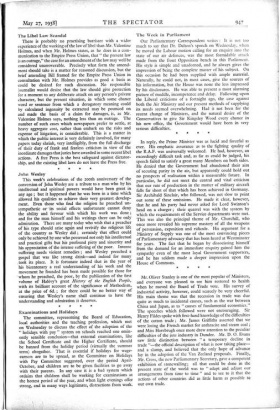Mr. Oliver Stanley is one of the most popular of
Ministers, and everyone was pleased to see him restored to health when he moved the Board of Trade vote. His survey of industrial activity, however, could scarcely be very cheerful. His main theme was that the recession in trade was due quite as much to incidental causes, such as the war between China and Japan, as to "causes of fundamental economics." The speeches which followed were not encouraging. Sir Henry Fildes spoke with first-hand knowledge of the difficulties of the cotton trade ; Mr. James Griffiths asserted that we were losing the French market for anthracite and steam coal ; and Miss Horsbrugh once more drew attention to the peculiar difficulties of the jute industry in Dundee. Mr. D. 0. Evans saw little distinction between "a temporary decline in trade "—the official description of what is now taking place— and a slump, and believed that the only hope of advance lay in the adoption of the Van Zeeland proposals. Finally, Mr. Cross, the new Parliamentary Secretary, gave a competent exhibition of stonewalling; all that could be done in the present state of the world was to "adapt and adjust our arrangements from time to time" and to see to it that the actions of other countries did as little harm as possible to our own trade.


















































 Previous page
Previous page